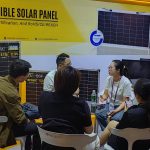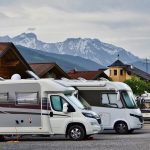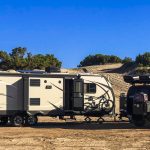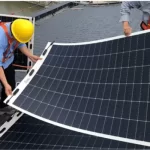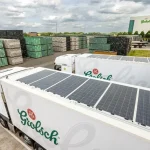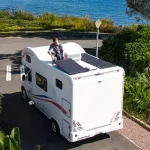Do you want to install solar panels on your camper or motorhome with solar panels but don’t know where to start? Are you thinking about switching to renewable energy to power your motorhome Boondocking? Are you also unsure how to run your air conditioner with rv solar power?
No matter what size RV you own, there are a few things you need to know about solar power for RV before you buy RV solar panels.
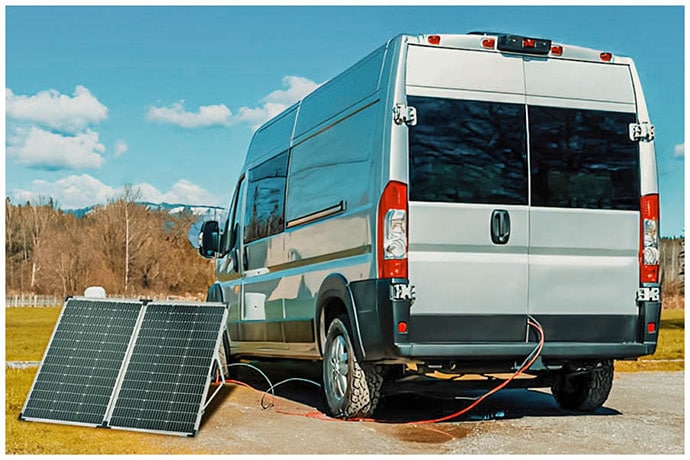
RV solar panel systems: which one is right for me?
When choosing solar power for an RV, for motorhome with solar panels or camper, you have two options to consider:
1) Portable RV solar panel systems
Portable RV solar panel systems are the easiest to install and use. These systems usually plug into a specialized solar plug on the RV and include one or more 100-watt solar panels that can be secured to the roof with Velcro straps.
There are all-in-one portable solar panels that are plug-and-play and can be hooked directly to a backpack. An example is the Sungold BXF series of integrated solar panels.
There are also portable solar panels/portable solar suitcases that support hand-carrying and are set up via a stand, such as the Sungold Hi-Powei series 200W solar panels.
You can connect the panels via solar wiring and place them in the sunniest areas around the caravan.
Portable RV solar panel systems are a great option for RVers who don’t need a lot of electricity. Perhaps you want to use lights, charge devices (e.g., cell phones, computers), and charge trailer batteries.
This option can also have the lowest total cost of entry, but keep in mind that you may have to pay more per watt for portability.
2) Permanent RV Solar Panel Systems
Installing permanent RV solar panels costs more upfront, but this option is the most efficient.
You will get the most out of each watt of solar energy invested and can maximize the use of unused roof space to install solar panels, which will collect sunlight constantly (i.e., while driving) and do not need to be installed after parking.
Permanent RV solar panel systems are usually installed by RV dealers or professional companies that specialize in RV solar panel installation.
These systems are designed for those who are trying to maximize the use of solar energy, not only for charging equipment, but also for operating appliances such as refrigerators, microwaves, coffee makers, and even air conditioners.
You can choose to install flexible solar panels or rigid solar panels on the roof of your RV. Flexible solar panels are easy to install and can be glued with 3MM glue. Rigid solar panels need to be drilled and screwed, or installed using solar brackets.
Sungold LEE series semi-flexible solar panels are a good example. High cost performance, easy to install, and high output power.
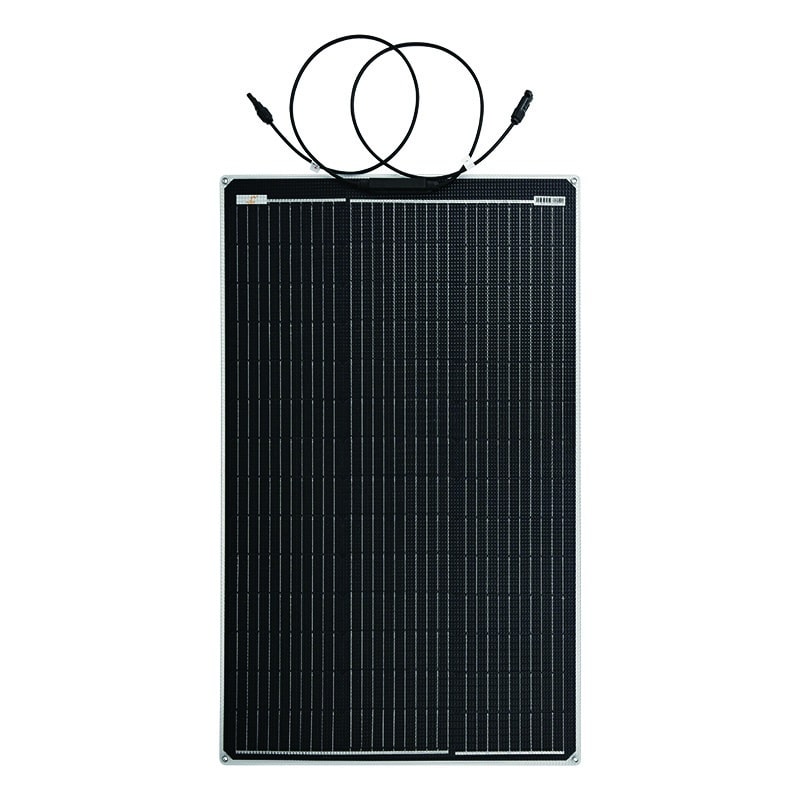
Sungold 100 Watt Solar Panels LEE-M2-100W
– Double-sided ETFE material
– High salt spray resistance
– IP67 waterproof rating
– High Power Output
– Industry-Leading Technology
– Perfect for marine applications
– Reliable and Durable.
Components Needed to Run an RV Air Conditioner with solar power for RV
When you equip your motorhome with solar panels with an air conditioner, each component plays a vital role in utilizing solar power to run efficiently. Let’s take a look at the various parts that make up the system.
Solar Panels
Your solar panels for RV are crucial because it is responsible for capturing sunlight and converting it into usable energy.
In order to maximize your energy production, you need efficient solar panels, especially because air conditioning has high power requirements.
Typically, RV air conditioners require panels with a total output of between 300 and 800 watts, depending on the BTU rating of the air conditioner and your expected usage.
Battery Pack
This assembly stores the electricity generated by the solar panels. You can use different types of batteries such as: B. Lead-acid batteries, AGM batteries (Absorbent Glass Mat) and Lithium-ion batteries.
Lithium-ion batteries are favored for their longer life and higher energy density. Battery pack size is usually measured in Ampere hours (Ah) and should be adjusted for the wattage of the system and the current draw of the air conditioner.
Inverter
The inverter’s job is to convert the direct current generated by the solar panels for RV and stored in the battery bank into alternating current that the air conditioner can use.
Make sure the wattage of the inverter matches or exceeds the wattage of your RV’s air conditioner. The soft start feature is useful because it reduces the initial power consumption when starting the air conditioner.
Charge Controller
The solar charge controller regulates the current flow from the solar module to the battery bank, thus preventing the battery from being overcharged.
This is an important safety feature that also prevents deep discharging, thereby maximizing the life of the battery pack.
Air Conditioner
RV air conditioners come with a compressor that should have the proper BTU output to effectively cool your room. Solar AC systems can be used with conventional appliances or specifically designed for solar applications. Consider appliances with a soft-start mechanism to minimize overvoltage stress on the system.
Additional Components
In addition to the main components, your system may include electrical panels for safe power distribution, a variety of switches, and a monitoring system for tracking how much power the solar panels are generating and how much power the air conditioner is using.
To choose the ideal solar AC system for your motorhome with solar panels, you need to understand the key specifications and accurately calculate your energy needs. It’s all about balancing available space, power requirements, and the right hardware investment.
Important specifications
There are a number of specific parameters you need to look at when evaluating solar systems for RV air conditioning:
BTU (British Thermal Unit): measures the cooling capacity of the air conditioner. Typical RV air conditioners range from 11,000 to 15,000 BTUs.
Wattage: The output of a solar module is measured in watts. You need panels that can provide enough solar wattage to meet or exceed the power consumption of the air conditioner when it is running.
Battery Storage: Your RV may need a battery bank to store the power generated by the solar panels. Capacity is usually measured in kilowatt hours (kWh).
Space on the RV: The size of your RV roof determines how many installing RV solar panels you can install. More panels mean more power, but you have to manage the space efficiently.
Can solar panels directly power the RV air conditioner?
Solar panels cannot directly power the caravan’s air conditioning, but they can store the electricity in batteries. This provides a sustainable and cost-effective solution.
During the day, the solar panels collect solar energy and convert it into DC electricity. With a charge controller, this electricity is stored in the batteries. The inverter then converts the DC power in the battery into AC power for the air conditioner.
In times of low sunlight or at night, the reserve power in the batteries continues to power the air conditioner, ensuring the continuity and reliability of the system. Solar panels utilize sunlight to generate electricity, reducing reliance on traditional power sources and lowering energy costs.
By using solar power for RV, you can enjoy a cooler RV environment without having to worry about draining your batteries or running a noisy generator. This eco-friendly approach also minimizes your environmental footprint, making your travels more sustainable.

When you’re planning to use solar power to run your RV’s air conditioner, there are a few crucial considerations.
First, make sure your solar system is large enough to meet the energy needs of your air conditioner.
The size of your RV air conditioner and the amount of sunlight available each day play an important role in determining the efficiency of your system. High-efficiency solar panels are essential for maximizing energy capture.
Backup batteries are also vital to ensure smooth and uninterrupted operation of your air conditioner.
Proper planning and installation of these components will ensure that your RV stays cool and comfortable while reducing your dependence on traditional power sources.
By taking these factors into consideration, you can effectively utilize solar power for RV to power your RV’s air conditioner and enjoy the benefits of a sustainable and reliable power solution while on the road.
What size solar generator do you need to run your air conditioner?
Choosing the right size solar generator for your air conditioner depends on your air conditioner’s power requirements and usage patterns.
Consider the operating wattage (power for continuous operation) and the start-up wattage (power for initial start-up, usually 2-3 times higher).
To calculate the minimum solar generator capacity required, use the following formula:
Minimum capacity (Wh) = (AC operating watts x hours of daily use) x 1.2
1.2 The multiplier takes into account system inefficiencies and start-up watts.
For example, a 500W alternator used 8 hours per day requires at least a 4,800Wh generator: (500W × 8h) × 1.2 = 4,800Wh. A 1,500W alternator used 6 hours per day requires at least 10,800Wh: (1,500W × 6h) × 1.2 = 10,800Wh.
Be sure to choose a slightly larger capacity for cloudy days and extra power needs. Make sure the inverter can manage the AC start-up power for reliable performance.
How long a solar generator can run AC power?
The ability of a solar generator to run AC depends on the generator’s capacity and the AC’s power needs. Typically, a medium-sized solar generator can power a small, high-efficiency air conditioner for 2-4 hours.
Considering optimal solar conditions, a high-capacity solar generator with 5000 Wh batteries, 90% inverter efficiency, and 1,000 watts of solar panels can run a 1,000-watt air conditioner for approximately 10.5 hours per day.
This duration can be extended if the solar panels are actively charging the generator during use, especially on sunny days.
Several things can be done to extend the air conditioning runtime of a solar generator:
- Use energy-efficient air conditioning models to reduce power consumption.
- Ensure that the cooling space is well insulated to maintain the temperature longer.
- Supplement with fans to improve air circulation and cooling efficiency.
- Maximize light from solar panels during the day for continuous charging.
- Consider extended battery capacity options for longer cooling times.
- Adjust AC settings to run at lower power when possible.
Pros and cons of running your air conditioner with motorhome with solar panels
When considering solar power for your RV’s air conditioner, it’s important to weigh the pros and possible cons.
Pros
- Renewable: your solar system uses solar energy, making it green and sustainable.
- Independence: You gain energy freedom and are less dependent on grid power and generators.
- Cost savings: over time, RV solar power can save you money by reducing the costs associated with traditional power sources.
Disadvantages
- Initial investment: Upfront costs for solar panels, batteries, and installation can be high.
- Space requirements: solar panels need to have enough space in your RV to be installed.
- Depends on the weather: the efficiency of the system will vary depending on weather conditions and will be less efficient on cloudy days.
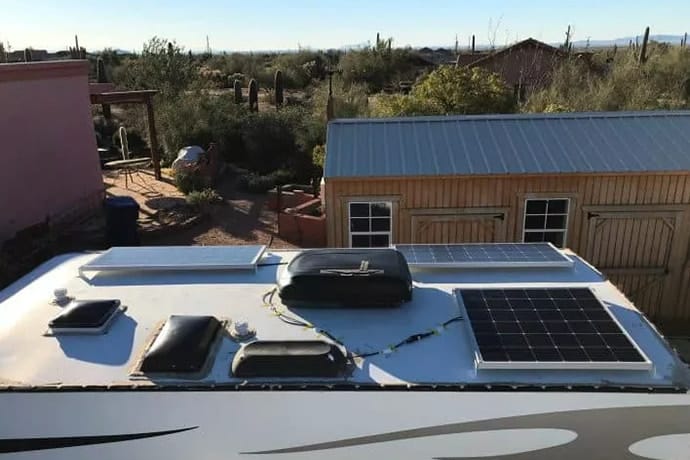
In summary
Solar air conditioning is a sustainable solution to keep motorhomes with solar panels cool on the road.
While running an RV air conditioner on RV solar power alone requires thoughtful system design and a significant investment, technology is advancing over time, making solar cooling increasingly practical.
For RV owners who value green energy and independence from shore power, advances in solar panel efficiency, battery storage capacity, and power requirements for cooling units will soon meet your off-grid air conditioning needs.


